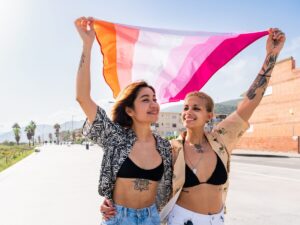Recognised as both a public health issue and a human rights violation, violence against women and girls (VAWG) physically and mentally affects at least one in every three women everywhere across the globe. The United Nations (UN) declared 25 November as the International Day for the Elimination of Violence Against Women in 1999.
This year, the day also calls attention to a pandemic outcome: statistics on VAWG are rising. There is increased exposure to violence because of Covid19 Pandemic lockdowns, the strain it has on health services and disruptions to support services, including, but not limited to violence shelters being at capacity.
As we continue to battle this pandemic, the UN alludes that VAWG is “the shadow pandemic,” as this type of violence has considerably increased over this period. According to UN Women, calls to helplines increased fivefold in some countries as restricted movement, social isolation, and economic insecurity are increasing women’s vulnerability to violence during the pandemic.
Unfortunately, unlike Covid19, a vaccine cannot help us eradicate it. According to the Director-General of the World Health Organization (WHO), Tedros Adhanom Ghebreyesus, we need individuals, communities, and governments to stand up and fight it. He says we need “deep-rooted and sustained efforts that will change harmful attitudes, improve access to opportunities and services for women and girls, and foster healthy and mutually respectful relationships.”
Intimate abusers
The UNWomen estimates that seven-hundred-thirty-six million women globally have been subjected to intimate partner violence, non-partner sexual violence or both at least once in their life. This data does not include sexual harassment.
The report concludes that victims are more often abused by their former husbands or intimate partners. Six-hundred-forty million women aged fifteen and older have been subjected to intimate partner violence, and almost one in four adolescent girls aged fifteen to nineteen have experienced physical or sexual violence from an intimate partner.
Only 6% of women across the globe reported they were sexually abused by someone other than their partners. The true extensiveness of non-partner violence is likely to be much higher.
According to the UNWomen, an appalling 82% of female parliamentarians reported having experienced some form of psychological violence, including remarks, gestures, images of sexist or humiliating sexual nature, threats, and mobbing. While 65% of them had been subjected to these psychological abuses from male colleagues in the parliament, 44% noted that threats of killing, rape, assault, and abduction were often from social media users.
Gender-based violence
VAWG, also referred to as gender-based violence, is pervasive and is the most violated human right worldwide. The UN Declaration on the Elimination of Violence against Women defines it as “any act of gender-based violence that results in, or is likely to result in physical, sexual or psychological harm or suffering to women, including threats of such acts, coercion or arbitrary deprivation of liberty, whether occurring in public or private life”. VAWG can be physical, sexual, psychological, and economic.

Dr Gunilla Krantz, Professor at the Department of Public Health of the University of Gothenburg, and Dr Claudia Garcia-Moreno, founder of the Sexual Violence Research Initiative, defines physical violence as aggressive acts such as kicking, biting, slapping, beating and strangling, while sexual violence includes forced sex, participation in degrading sexual acts and the denial of the right to use contraceptives or any measures to protect oneself from sexually transmitted diseases.
Psychological violence
The consequences of violence go far beyond the immediate impact on the victims, resulting in both short-term and long-term physical, mental, sexual, and reproductive health problems.
An often-overlooked type of violence perpetrated against women is psychological abuse. Drs Krantz and Garcia-Moreno describe acts such as belittlement, humiliation, economic restrictions, threats, controlling behaviours as psychological, mental, and emotional violence.
The Netflix Limited Series Maid, which is inspired by The New York Times bestselling memoir Maid: Hard Work, Low Pay and a Mother’s Will to Survive, by Stephanie Land, highlights that emotional abuse is domestic violence. It is an October 2021 release that is treating this issue properly and bringing massive attention to it.
Survivors of VAWG often suffer injuries, contract sexually transmitted diseases and may endure gynaecological problems. Acts of abuse also have trickled down effects on their children’s health and wellbeing. Many of them face unwanted pregnancies while others suffer miscarriages, stillbirths, preterm labour, and low birth weight babies.
Murder and suicide
In the worst cases – unfortunately, very common -, violence against women has fatal outcomes. While some are killed by their abusers or by the repeatedly injuries perpetrated by them, others die by suicide. Several studies have found that domestic violence induces suicidal thoughts and ideation.
According to DomesticShelters.org, 23% of survivors have attempted suicide. A 2018 study conducted by the University of Warwick found that 24% of women supported by the Domestic Abuse Charity Refuge felt suicidal at some point, while 83% reported having feelings of despair and hopelessness. Dr Sylvia Walby, Professor of Sociology and Director of the Violence and Society Centre at the City University of London, presented research uncovering that one in eight of all female suicides and suicide attempts in the UK resulted from domestic violence.
Orange the World
The UN General Assembly established the day following the Latin-American feminist movement that in 1981 started to convoke women for remembering the date in which three Dominican political activists, the sisters Mirabal (Patria, Minerva, and María Teresa), were killed by the country dictator.
The United Nations Day for the Elimination of Violence Against Women 2021 is seeking to Orange the World by imploring survivors, activists, decision-makers, and individuals across the globe from every walk of life to shine a light on the need for funding, essential services, prevention and data that shapes better-informed responses. A global effort is required, and it is vital to end this shadow pandemic. The United Nations posit that an individual’s actions can save a woman.
Here are a few ways each of us can make an impact:
- Initiate conversations: VAWG is avoidable if we speak up for victims, speak out against abusers, stand in solidarity with survivors, and use platforms to educate masses and to pressure governing bodies and authorities to enact stricter legislations.
You can show your solidarity by arranging your social media profile for the 16 Days of Activism from 25 November to10 December
Facebook and Twitter both have downloadable banners;
Instagram has a UN Women’s face filter;
Follow and join conversations by using #orangetheworld, #16Days and #GenerationEquality.
- Listen to and don’t shame survivors: Fewer than 40% of the women who experience violence seek help. When a survivor is speaking up, be sure to listen. Using their voice is the first step they take to break the cycle of abuse they are facing. It is easy for an outsider to ask, “Why didn’t she leave?”, but, realistically, it isn’t as easy as it sounds. We are the support system to get them out. We must allow them a safe space without judgement or shame.
- Look out for signs of abuse: This article by the UN highlights some common signs of abuse and what you can do to help a victim. Let’s be our sister’s keepers. If you suspect a woman or girl is being abused, learn about the ways to help find safety and support. If you think you are being abused, tell someone you trust and speak with a trained advocate. A list of worldwide helplines can be found in the article.
- Challenge and eradicate rape culture: It is reproduced when we allow misogynistic language, the objectification of women’s bodies and the glamorisation of sexual violence. Change the narrative from blaming the victim, scrutinizing her dress, behaviours, history, and mental state. Put more attention on teaching men to not rape over teaching women how to avoid being raped.
Teach the next generation about gender, respect, and human rights. Too often, parents shy away from these topics believing it is too heavy for a child, but these conversations on gender roles, consent, and the right to make decisions over one’s own body are essential to have early on to break the cycle. The next generation is the future, so by educating them will build a better future for all.

















